The name Leonard “Red” Kelly is well-known around the Toronto area for multiple reasons: a four-time Stanley Cup Champion with the Toronto Maple Leafs and the team’s former coach, as well as being a Member of Parliament for the riding of York West. His name is not as common around Pittsburgh, but in the late 1960s and early 1970s, Kelly led the Pittsburgh Penguins to their first taste of the NHL postseason.
Kelly died on May 2 at age 91 and will be remembered for a myriad of great accomplishments in the hockey community and beyond.
Red Kelly’s Road to Coaching
Born on July 9, 1927, in Simcoe, Ontario, Kelly earned the less-than-creative nickname “Red” because of his ginger-colored hair. While his locks made him stand out from the crowd, that wasn’t enough to win over a Maple Leafs scout who predicted the defenseman would not be able to last 20 games in the NHL, passing the 19-year-old over as a pick to join the Toronto squad.
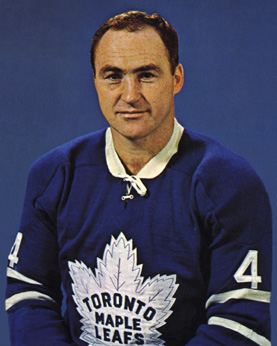
Kelly joined the Detroit Red Wings in 1947 and played 12 seasons with the club, winning eight regular-season championships, four Stanley Cups, three Lady Byng Trophies, the first ever James Norris Memorial Trophy, and was a runner-up for the Hart Memorial Trophy in 1954.
Despite years of sweet success, Kelly’s time with the Red Wings ended on a sour note. Near the end of the 1958-59 season, Kelly broke his ankle. While the coach and other players knew about the injury, they kept quiet and Kelly continued to play as close to normal as possible.
Whether as a direct result of Kelly’s injury or by pure coincidence, the Red Wings missed the playoffs for the first time in 21 years in 1959. When general manager Jack Adams learned that Kelly had been playing with a broken ankle, he tried to spearhead a trade that would have sent Red and four other players to the New York Rangers. Kelly escaped the deal by announcing he would retire rather than go to New York.
Related: Jack Adams, the Man and the Award
Maple Leafs’ coach Punch Imlach was quick to step in and play a round of Let’s Make a Deal to entice Red to join his squad. Despite Kelly’s dislike of the Maple Leaf Gardens arena and a bit of ill-will still harbored after being passed over years ago, he agreed to a trade to Toronto and a switch in position from defense to center.
The move was worthwhile, as Kelly won another four Stanley Cups and his fourth Lady Byng Trophy with the Maple Leafs. He retired from the NHL as a player following Toronto’s 1967 Stanley Cup win. At the time of his retirement, Kelly was seventh all-time in career points, fifth in assists, 13th in goals, and second in games played.
Red Kelly Joins the Pittsburgh Penguins
Kelly’s retirement as a player coincided perfectly with the “Next Six” expansion, allowing him to begin his coaching career with the Los Angeles Kings. He led the team to second place in the new Western Division and to the playoffs in both of their first two seasons. The Penguins, on the other hand, under their inaugural coach George “Red” Sullivan, finished fifth in the Western Division both seasons and failed to qualify for the playoffs.
Though Kelly was a successful coach in Los Angeles, his vision for the team did not mesh with that of owner Jack Kent Cooke, who sought to make the Kings more like the Los Angeles Rams football team. Of Cooke’s involvement in training, Kelly told Pittsburgh Press reporter Roy McHugh:
“[The Kings] did all the things that football players do. Up and down, up and down on their stomachs. And [Cooke’s trainer, an assistant coach for the Rams] ran ‘em around the aisle that circles the top of the building. That was the one thing I didn’t want them to do… I didn’t want them to run, because you use different muscles in running and skating, and even runners don’t run on concrete. But he ran ‘em and ran ‘em. He did it again the next day and they all had shin splints,”
(from ‘L.A.’s A Great Town To Be From, Says Red,’ Pittsburgh Press – 7/3/69).
By the end of the 1968-69 season, Kelly was ready for a change. He signed just a one-year contract, at his own request, on July 2, 1969 to coach the Penguins. He turned the team around, leading them to a 26-38-12 record, second place in the Western Division, and their first-ever playoff berth.
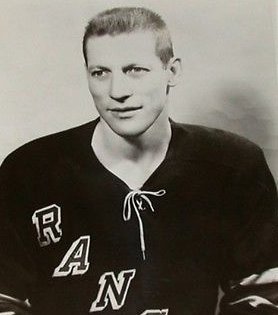
Pittsburgh played the Oakland Seals in the conference semifinal round, sweeping the series that boasted accomplishments like Ken Schinkel’s hat trick in a 5-2 victory in Game 3, and Michel Briere’s overtime game and series winner in Game 4 at the Civic Arena.
In the conference final round, the Penguins met the St. Louis Blues. They dropped the first two games on the road and won the next two at home to split the series, but they were unable to hold on, losing Game 5 in St. Louis by the score of 5-0 and Game 6 by the score of 4-3.
Though the Penguins did not hoist the Stanley Cup in 1970, both Kelly and general manager Jack Riley were excited about the new, successful direction in which the team was headed. Kelly signed a five-year, $250,000 contract on May 21, 1970 to not only continue as head coach, but also take over the role of general manager while Riley performed other duties within the organization.
When asked about the change in positions, Riley told Bill Heufelder of the Pittsburgh Press:
“I can’t say anything against the change because I really don’t feel bad about it. Let’s face it, the key to hockey in Pittsburgh is Red Kelly,”
(from ‘Riley, Kelly Take Spin on Wheel of Fortune,’ Pittsburgh Press – 5/22/70).
With Kelly at the helm of both on- and off-ice management, the franchise felt like its first Stanley Cup could be within reach in the next few years.
Red Kelly’s Quirks Behind the Scenes
For the first two years in team history, the Penguins were used to the coaching style of the hot-tempered Irishman Sullivan, who yelled, cursed, and even broke furniture in the heat of the moment.
Related: Penguins’ First Coach Red Sullivan Set Tone for Franchise
Though they shared the nickname “Red,” Sullivan and Kelly were drastically different in temperament. According to a 1970 Pittsburgh Press article, Kelly never swore. “Hang” and “dang,” it is said, were Kelly’s favorite expletives.
On Nov. 22, 1969, following two bad periods against the Philadelphia Flyers that left the Penguins trailing 3-0, Kelly really let the players have it. According to a winger who wanted to remain anonymous:
“[Kelly] gave us 14 dangs and 18 hangs. Then he said we were sons of seacooks,”
(from ‘Hanging In There,’ Pittsburgh Press – 3/6/70).
Though the innocent cursing was amusing to the players, they knew Kelly was fired up and serious about turning the game around. The Penguins scored five goals in the third period and won the game.
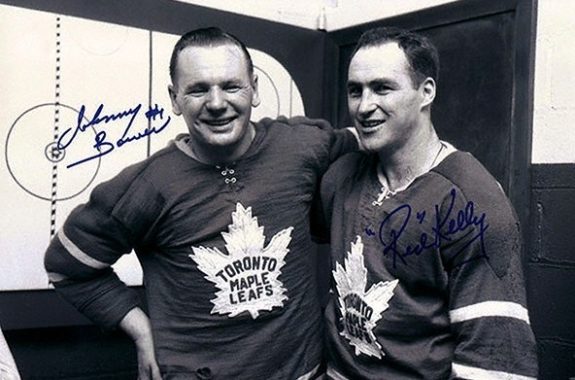
Kelly was also known for pacing excessively during games. He was always on the move behind the bench, never standing still. A Penguins season-ticket holder told Al Abrams of the Pittsburgh Post-Gazette:
“[Kelly] must pace something like five miles behind the bench during a game. The man doesn’t know when to stand still or sit down. He’s forever on the move watching every play, no matter which way he is pacing,”
(from ‘Sidelight on Sports – Top Pacer – Mr. Red Kelly,’ Pittsburgh Post-Gazette – 10/28/70).
These quirks, some speculated, could be the key to Kelly’s success, but his players knew the truth. Left winger Val Fonteyne told the Pittsburgh Press’ Roy McHugh that there was, in fact, no secret to Kelly’s success at all. “He’s a winner,” Fonteyne said. Plain and simple.
Red Kelly’s Homecoming
As is still the practice in the NHL today, when a team makes a coaching change and turns a season around the coach receives an abundance of praise. The same was true for Kelly in 1970, earning National Hockey League Coach of the Year honors from The Hockey News, as well as the extended contract and addition of general manager duties.
However, also still common today, when things go south again the coach is the first man on the chopping block.
Kelly and the Penguins could not keep their winning momentum going throughout the 1970-71 season. They finished the regular season in sixth place in the Western Division, their worst seeding in franchise history so far, and they did not qualify for the playoffs.
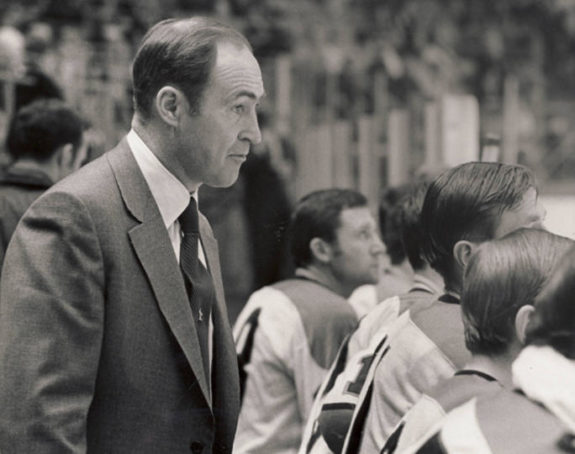
The slump continued into the 1971-72 season, forcing Kelly to relinquish his general manager duties back to Riley to focus solely on coaching. The Penguins finished fourth in the Western Division that season and qualified for the playoffs again, but were swept by the Chicago Blackhawks in the first round. The Penguins fired Kelly on Jan. 13, 1973. He was replaced by his former player Ken Schinkel.
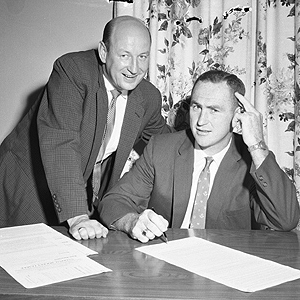
The firing left Kelly and his family feeling rejected and dejected, as he had all those years ago when the scouts in Toronto passed him over. Kelly’s wife, Andra, put their home in Pittsburgh up for sale the day he was fired. He told the Pittsburgh Post-Gazette in 1973 her reasoning was “We don’t want to stay in a place where we’re not wanted.”
From inside the organization, Kelly’s firing may have felt like a slight, but the fans eagerly awaited his return. When he came back to the Civic Arena as head coach of the Maple Leafs during the 1973-74 season he earned a standing ovation from the 8,425 fans in attendance, some of whom even made signs to show their appreciation for the former coach. He also left with a 4-3 victory in his favor.
During his coaching career with the Kings, Penguins, and Maple Leafs, he stood behind the bench for 742 regular-season games and had a 278-300-134 record. He also coached 62 playoff games and won 24 of them.
In the years following his complete retirement from the NHL, Kelly was still a common name around the league and throughout the sport. In 1998, Kelly ranked No. 22 on The Hockey News’ list of 100 Greatest Hockey Players; he was inducted into the Hockey Hall of Fame in 1969, the Ontario Sports Hall of Fame in 2001, and named to the NHL 100 Greatest Players list in 2017. Kelly’s No. 4 jersey was retired by the Maple Leafs on Oct. 15, 2016, and the Red Wings on Feb. 1, 2019.
While these may be the accomplishments attributed to Kelly throughout the league and throughout history, he’ll always be remembered in Pittsburgh as the first coach to bring the spark of Stanley Cup dreams to the Penguins organization.